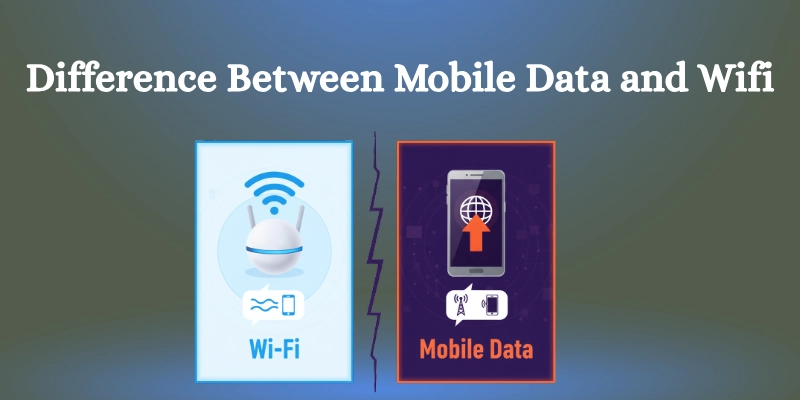Mobile Data vs Wi-Fi – Key Differences, Benefits & Best Uses
Published: 10 Sep 2025
In today’s digital world, internet connectivity is more important than ever. Whether you’re streaming, working remotely, or browsing social media, you rely on either mobile data or Wi-Fi to stay connected.
But what exactly is the difference between the two, and when should you choose one over the other? This guide explores the key factors such as signal strength, bandwidth, latency, security risks, and more so you can make smarter choices for your online needs.
In this article, we will discuss the key differences between mobile data and Wi-Fi, covering their speed, coverage, cost, security, and best use cases in detail.
What is Wi-Fi?
Wi-Fi is a wireless network technology that connects devices to the internet via a router. It typically relies on a broadband connection and is ideal for homes, offices, and public places. Wi-Fi networks have a limited coverage area, usually up to a few hundred feet, and their performance can be affected by walls, interference, or too many users.
What is Mobile Data?
Mobile data, also called cellular data, connects you to the internet through your carrier’s data plan using nearby cell towers. It works almost anywhere within the provider’s coverage area, making it highly useful when traveling or working on the go. Mobile data is available in different generations like 4G LTE and 5G, which directly influence speed comparison and latency.

Difference Between Mobile Data and Wi-fi
The following are the main differences between mobile data and Wi-Fi.
- Speed & Performance
- Coverage & Accessibility
- Cost & Data Limits
- Security & Privacy
- Hotspot & Sharing
- Network Congestion
- Reliability & Stability
Let’s have a look at them in detail.
Speed & Performance
The following is a breakdown of how mobile data and Wi-Fi differ in terms of speed and performance.
- Wi-Fi: Generally provides higher bandwidth and lower latency when connected to a strong router. This makes it excellent for gaming, HD streaming, and large file downloads.
- Mobile Data: Speed varies based on network type (3G, 4G, 5G) and signal strength. 5G networks can rival or even outperform home Wi-Fi in some regions.
Speed comparison tip: Wi-Fi is usually more consistent indoors, while 5G mobile data excels in mobility and outdoor use.
Coverage & Accessibility
The following explains how mobile data and Wi-Fi compare in terms of coverage and accessibility.
- Wi-Fi: Offers reliable internet within its set coverage area, but you lose connection once you move too far from the router. Accessibility is limited to places where Wi-Fi is installed.
- Mobile Data: Available across cities, highways, and rural zones depending on your provider’s network. Its accessibility makes it essential for travelers and people without fixed broadband.
Cost & Data Limits
The following highlights the differences between mobile data and Wi-Fi when it comes to cost and data limits. Understanding this can help you choose the most cost-efficient option for your needs.
- Wi-Fi: Typically more cost-efficient because you pay a fixed monthly broadband bill. Public hotspots can even offer free access.
- Mobile Data: Tied to your data plan. Plans may include a data limit, and exceeding it could slow your connection or increase costs. For heavy internet users, Wi-Fi is often the more affordable option.
Security & Privacy
The following outlines how mobile data and Wi-Fi differ in terms of security and privacy. Knowing these differences can help you protect your personal information online.
- Wi-Fi Security Risks: Public Wi-Fi hotspots can expose you to privacy concerns, hacking attempts, or data theft. Using a VPN can help reduce these risks.
- Mobile Data Security: Generally more secure because traffic is encrypted through the carrier’s network, making it harder for attackers to intercept.
Hotspot Capability & Network Congestion
The following explains how mobile data and Wi-Fi differ in terms of hotspot capability and network congestion.
- Wi-Fi: Usually shared by multiple users, which can lead to network congestion and reduced speeds during peak hours.
- Mobile Data: Modern smartphones support hotspot capability, allowing you to share your cellular connection with other devices. However, tethering may quickly eat into your data limit.
When Should You Use Wi-Fi vs. Mobile Data?
The following explains practical scenarios of when it’s better to use Wi-Fi and when mobile data is the smarter choice.
Use Wi-Fi when:
- You’re at home, work, or a trusted location
- You need high bandwidth for streaming or gaming
- You want to save mobile data and ensure cost efficiency
Use Mobile Data when:
- Wi-Fi is unavailable or unsafe
- You’re traveling or outdoors and need reliable internet connectivity
- You’re concerned about privacy and want to avoid public Wi-Fi security risks
Comparison Table
The following comparison table summarizes the key differences between mobile data and Wi-Fi for quick reference.
| Feature | Wi-Fi | Mobile Data |
| Speed Comparison | Stable, high bandwidth | Varies, 5G can be very fast |
| Coverage Area | Limited to router range | Wide, depends on provider |
| Cost Efficiency | Fixed broadband plans | Based on data plan & limits |
| Latency | Low (ideal for gaming) | Low with 5G, higher on 3G/4G |
| Security Risks | Public hotspots vulnerable | More secure, encrypted |
| Accessibility | Limited to installed routers | Available almost anywhere |
| Hotspot Capability | Router-based only | Supported on smartphones |
Conclusion
Both mobile data and Wi-Fi play essential roles in today’s connected lifestyle. Wi-Fi offers cost efficiency, high bandwidth, and stability within a limited coverage area, while mobile data provides unmatched accessibility, mobility, and stronger protection against privacy concerns.
The best choice depends on your needs whether you prioritize speed and affordability at home, or flexibility and reliability on the go. By understanding these differences, you can manage your internet connectivity smarter and avoid unnecessary costs, security risks, or performance issues.
✨ Now it’s your turn: Do you rely more on Wi-Fi or mobile data in your daily routine? Share your experience in the comments below!
FAQs
Here are some common questions and simple answers about mobile data and Wi-Fi to help you clear any confusion.
Mobile data connects you to the internet through your cellular network, while Wi-Fi uses a wireless router connected to a fixed broadband line. Mobile data works anywhere with network coverage, while Wi-Fi is usually limited to a specific location. Both give you internet access but in different ways.
Wi-Fi is usually faster when connected to a strong broadband network. However, 4G and 5G mobile data can sometimes match or even exceed Wi-Fi speeds. Your experience depends on signal strength, network congestion, and service provider.
In most cases, yes home Wi-Fi plans usually offer unlimited data for a fixed monthly cost. Mobile data is often limited and more expensive if you use it heavily. Still, mobile data is convenient when you’re on the move.
Yes, some devices support features like “Wi-Fi Assist” or “Dual Connectivity” that automatically switch between networks for the best performance. But typically, your device uses one at a time. This ensures smoother browsing and fewer interruptions.
Mobile data is generally safer because it uses encrypted connections from your cellular provider. Public Wi-Fi networks, on the other hand, can be risky if not secured properly. Always use a VPN or avoid sensitive activities on public Wi-Fi.
This can happen if your Wi-Fi router is outdated, too many devices are connected, or your broadband plan has limited speed. Mobile data may feel faster if you are in a strong 4G or 5G coverage area. Speed depends on both network quality and congestion.
Yes, most smartphones allow you to create a personal hotspot. This lets you share your mobile data with laptops, tablets, or other phones. Keep in mind that this uses up your data allowance quickly.
Yes, Wi-Fi is better for streaming because it usually offers unlimited data and stable speeds. Using mobile data for long video sessions can drain your data plan quickly. Wi-Fi also helps reduce buffering in most cases.
Yes, Wi-Fi generally consumes less battery because your phone doesn’t need to constantly search for cellular signals. Mobile data, especially 4G/5G, can use more power. However, weak Wi-Fi signals may still drain the battery faster.
Use Wi-Fi whenever you’re at home, office, or any trusted location to save on mobile data costs. Switch to mobile data when you’re traveling, in areas without Wi-Fi, or need a secure connection. Balancing both helps you stay connected efficiently.

- Be Respectful
- Stay Relevant
- Stay Positive
- True Feedback
- Encourage Discussion
- Avoid Spamming
- No Fake News
- Don't Copy-Paste
- No Personal Attacks

- Be Respectful
- Stay Relevant
- Stay Positive
- True Feedback
- Encourage Discussion
- Avoid Spamming
- No Fake News
- Don't Copy-Paste
- No Personal Attacks





